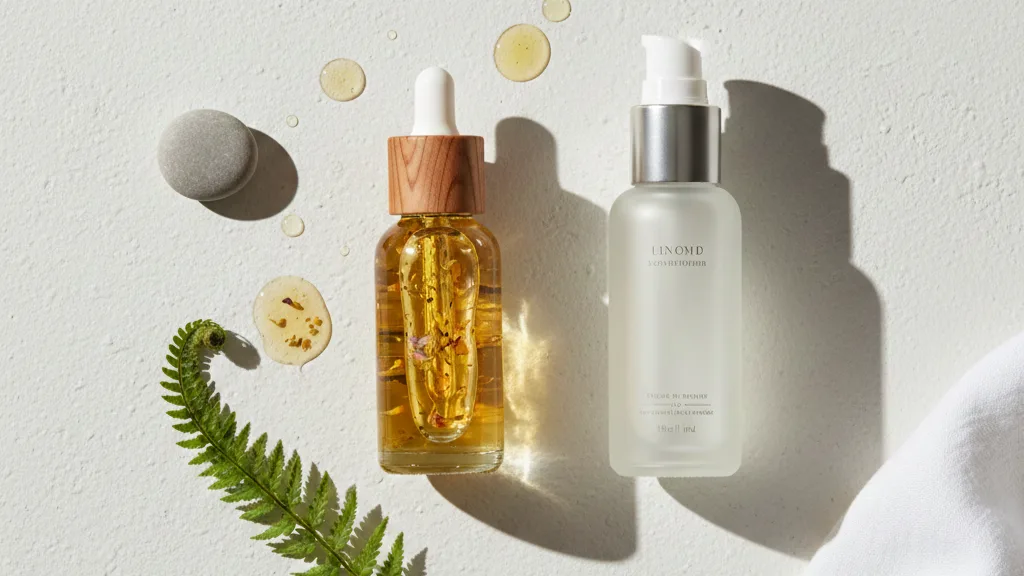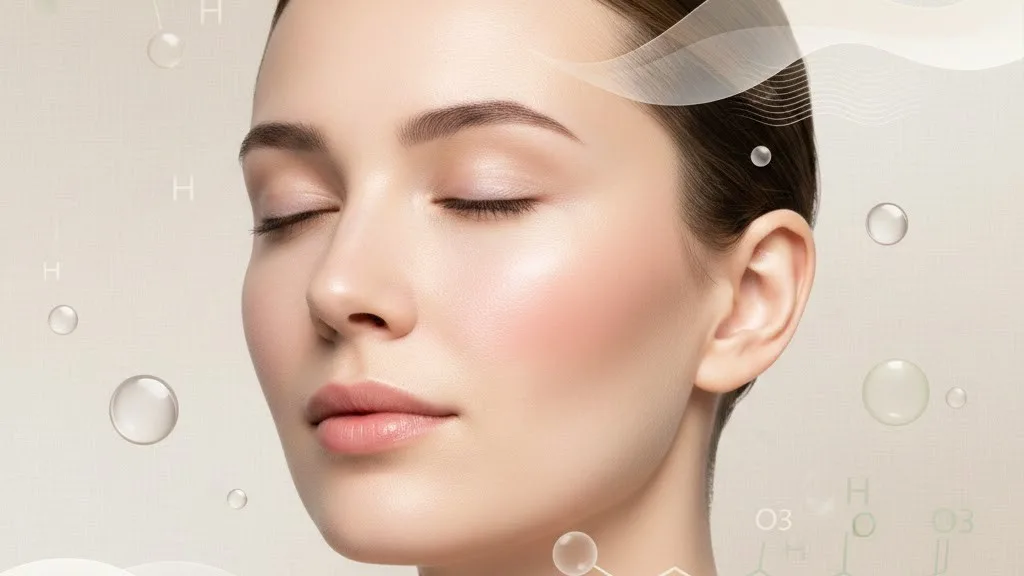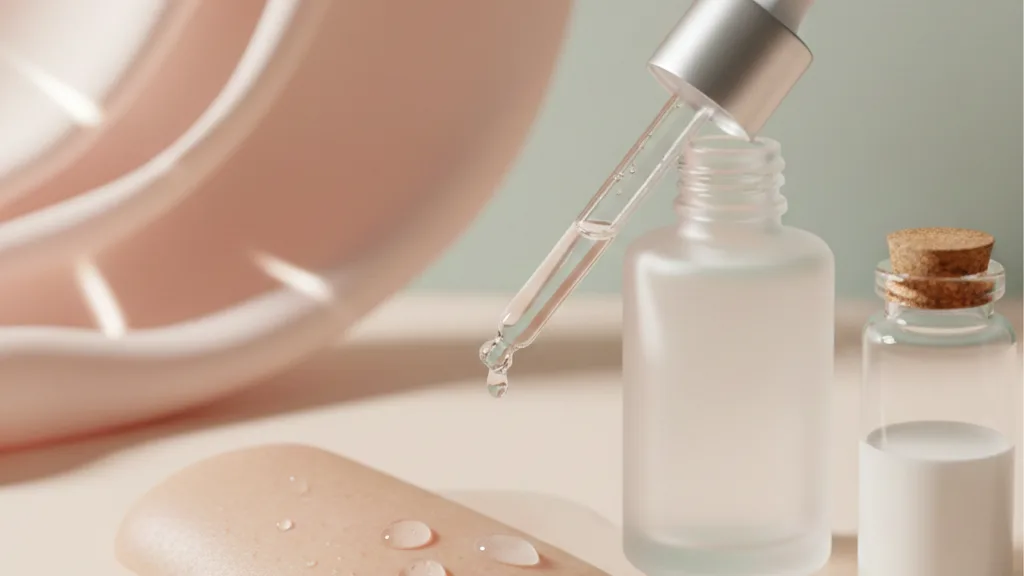In this third edition of Beauty Unblurred, we take a closer look at a debate shaping today’s haircare conversations: scalp oil vs serum and which one genuinely contributes more to hair growth. As consumers shift between age-old oiling traditions and breakthrough formulations powered by peptides and botanicals, the need for clarity has never been greater.
Both scalp oils and hair serums claim to support healthier, stronger hair, yet they work through distinctly different mechanisms. Understanding these nuances is crucial, especially in a landscape where routine fatigue and product overload are common. This edition distills the science, separates fact from assumption, and offers a grounded, expert-backed direction to help you build a growth routine that delivers visible results.
In this Article
- What Is the Difference Between Scalp Oil and Hair Serum?
- Which One Is Better for Hair Growth?
- Benefits of Scalp Oil for Hair Growth
- Benefits of Hair Serum for Growth Retention
- How to Use Scalp Oil Effectively for Growth
- How to Use Hair Serum Correctly
- Best Scalp Oils for Supporting Hair Growth
- Best Hair Serums for Protection and Length Retention
- Natural and Affordable Skincare Alternatives
- Precautions, Myths, and Frequently Asked Questions
- Neisha Arora’s Editorial Insight
- Keep The Vibe Going
What Is the Difference Between Scalp Oil and Hair Serum?
Understanding scalp oil vs serum begins with how each product works on different parts of your hair.
A scalp oil nurtures the roots and directly influences the hair-growth environment. A hair serum, meanwhile, protects the strands and prevents external damage.
In other words, scalp oils act at the source, while serums work along the lengths. Together, they represent two sides of a complete hair-care approach—internal strengthening and external defence.
Scalp Oil: The Root-Focused Treatment
When comparing scalp oil vs serum, it’s clear that scalp oils work at a deeper, more restorative level. These rich, nutrient-dense blends—often infused with botanical extracts and actives like rosemary or bhringraj—nourish follicles, reduce inflammation, support microcirculation, and strengthen the scalp barrier.
Hair Serum: The Surface-Focused Protector
Hair serums are modern, lightweight formulations designed to smooth the hair cuticle, reduce frizz, limit heat and environmental damage, and enhance shine. Serums rarely penetrate the scalp or influence follicular activity. Instead, they create a protective coat that helps preserve the length you’ve already grown.
Which One Is Better for Hair Growth?
From a biological perspective, scalp oils offer greater support for growth because they target the follicle. Serums do not trigger new growth but they minimize breakage and damage, allowing the hair to retain its length. The most effective regimen often includes both: oiling for nourishment and serums for preservation.
Benefits of Scalp Oil for Hair Growth
Strengthening the Follicle
Scalp oils provide essential fatty acids, vitamins, and antioxidants that reinforce follicular strength. Stronger roots often translate to reduced shedding.
Improved Scalp Circulation
A gentle oil massage stimulates blood flow, increasing nutrient delivery to the follicles. This supports the growth phase of the hair cycle.
Reduction in Dryness and Flakiness
A balanced scalp barrier prevents irritation and dryness—two factors that weaken follicles and contribute to breakage near the root.
Support for Thicker, Fuller Hair
With consistent use, scalp oils can improve hair density by supporting follicle health over time.
Benefits of Hair Serum for Growth Retention
Protection From Environmental Stress
Pollution, UV exposure, and humidity can all degrade hair quality. Serums create a defensive layer to limit this impact.
Reduced Breakage
By smoothing the cuticle and minimizing friction, serums prevent unnecessary snapping, especially during detangling or heat styling.
Enhanced Shine and Manageability
A polished cuticle reflects light better, leaving hair smoother and visually healthier.
Heat-Safe Styling
Modern serums often include heat-protectant ingredients that reduce damage from blow-dryers, straighteners, and curling tools.
While serums do not stimulate new growth, they safeguard the progress made at the root.
How to Use Scalp Oil Effectively for Growth
To maximize absorption and nutrient delivery, follow this structured method:
- Warm one to two teaspoons of oil until lightly heated.
- Divide your hair into sections and apply directly to the scalp.
- Massage gently in circular motions for three to five minutes.
- Leave the oil on for at least 45 minutes. Overnight works well for dry scalps.
- Rinse with a gentle, sulphate-free shampoo.
- Limit oiling to one or two times a week to avoid buildup.
How to Use Hair Serum Correctly
Serums must be applied with precision to prevent greasiness:
- Start with damp or towel-dried hair.
- Take a coin-sized amount of serum.
- Apply from the mid-lengths to the ends.
- Avoid the scalp entirely.
- Follow with your regular styling routine.
For heat protection, apply an additional heat-safe serum before using hot tools.
Best Scalp Oils for Supporting Hair Growth
Below are high-performing scalp oils and scalp-serum alternatives suitable for various hair types.
Kama Ayurveda Bringadi Thailam
A traditional Ayurvedic blend designed to strengthen roots and reduce excessive shedding.
The Ordinary Multi-Peptide Serum for Hair Density
A lightweight, non-oily alternative for those with oily or acne-prone scalps. Ideal for growth-focused routines without the heaviness of traditional oils.
Forest Essentials Hair Vitalizer
A botanical-forward formula enriched with Ayurvedic herbs to support hair density and overall scalp vitality.
Minimalist Hair Growth Actives (Redensyl + Procapil)
A science-backed formulation suited for those preferring minimal, fast-absorbing products targeting follicular activity.
Best Hair Serums for Protection and Length Retention
L’Oréal Paris Extraordinary Oil Serum
A versatile serum offering shine, smoothness, and daily protection, especially for frizz-prone hair.
Pilgrim Redensyl & Anagain Hair Serum
A growth-supporting serum designed for thin, brittle strands. It complements scalp treatments well.
Wella Professionals Luminous Smoothening Oil
A salon-grade formula that softens and restores lustre while protecting the lengths from styling fatigue.
Streax Professional Vitariche Gloss Serum
A budget-friendly bestseller that effectively manages frizz and adds shine.
Natural and Affordable Skincare Alternatives
For readers inclined towards minimal or natural routines, foundational oils remain reliable:
- Coconut oil for deep nourishment
- Castor oil for thickness and root strength
- Rosemary oil for its well-researched growth-supportive properties
- Almond oil for a lightweight, moisturising finish
For a serum-like effect without silicones, aloe vera gel, argan oil, or flaxseed gel offer smoothness and lightweight hydration.
A holistic addition is scalp stimulation through facial massage and face yoga, which enhances circulation and overall vitality — and you can explore techniques in our guide to the Best Face Yoga for Jawline Definition.
Precautions, Myths, and Frequently Asked Questions
A. Heavy oils can clog pores if left on too long or applied excessively. Those with oily scalps should opt for lightweight formulations or peptide serums.
A. Yes. When used on the lengths, serums are safe for daily use and help maintain a polished appearance.
A. No. They serve separate purposes and work best when applied individually and correctly.
A. A lightweight scalp serum or a fast-absorbing oil is ideal. Avoid heavy blends like castor or thick herbal formulations.
A. A repairing serum offers immediate—and often more visible—benefits for damaged lengths.
A. Scalp oils influence growth at the root, while serums protect your existing length. For sustained progress, both can be incorporated strategically.
Neisha Arora’s Editorial Insight

“Hair thrives when the scalp is nurtured and the lengths are protected. Scalp oils help create a fertile environment for growth by supporting the follicle, while serums preserve the integrity of the hair you have already grown. A balanced routine does not choose between the two; it understands their individual strengths.”
— Neisha Arora
This expert lens aligns with Hale and Belle’s philosophy: beauty rooted in science, clarity, and mindful routines.
Takeaway
Scalp oils and hair serums were never meant to compete; they were designed to serve different stages of the hair’s journey. For true growth support, the foundation begins at the scalp. For protection, polish, and long-term length retention, a serum becomes indispensable—especially if your lifestyle includes heat styling, colouring, or daily environmental stress. The most effective routines don’t choose sides; they combine both, with intention and consistency.
To explore more evidence-led rituals, ingredient breakdowns, and expert guidance beyond this scalp oil vs serum conversation, visit the full haircare verticle on Hale and Belle. Let your choices be informed, your routine purposeful, and your results rooted in science rather than speculation.
Want the latest scoop, exclusive deals, and skincare secrets? Follow us on WhatsApp and never miss a glow-up moment!




